|
|
|
Sort Order |
|
|
|
Items / Page
|
|
|
|
|
|
|
| Srl | Item |
| 1 |
ID:
120357


|
|
|
|
|
| Publication |
2013.
|
| Summary/Abstract |
Between September 2009 and April 2011, around one-half of the Catalan municipalities held unofficial referendums on independence from Spain, in which more than 800,000 citizens took part. However, the participation rates were unevenly distributed across Catalonia. In this paper, using an original data set, we aim to respond to two relevant questions: first, why in some municipalities the referendum took place and in others it did not occur. Second, why did the referendum achieve high rates of turnout in some localities and much lower participation in others. We find that the resources available to the movement, the intensity of the mobilization efforts, the participatory tradition of the municipalities and the size of the nationalist 'sentiment pool' in each locality explain to a great extent the internal variation in nationalist mobilization in Catalonia.
|
|
|
|
|
|
|
|
|
|
|
|
|
|
|
|
| 2 |
ID:
172036
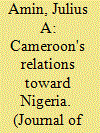

|
|
|
|
|
| Summary/Abstract |
Existing literature argues that the tactics of Cameroon foreign policy have been conservative, weak and timid. This study refutes that perspective. Based on extensive and previously unused primary sources obtained from Cameroon's Ministry of External Relations and from the nation's archives in Buea and Yaoundé, this study argues that Cameroon's foreign policy was neither timid nor makeshift. Its strategy was one of pragmatism. By examining the nation's policy toward Nigeria in the reunification of Cameroon, the Nigerian civil war, the Bakassi Peninsula crisis and Boko Haram, the study maintains that, while the nation's policy was cautious, its leaders focused on the objectives and as a result scored major victories. The study concludes by suggesting that President Paul Biya invokes the same skills he used in foreign policy to address the ongoing Anglophone problem, a problem that threatens to unravel much of what the country has accomplished.
|
|
|
|
|
|
|
|
|
|
|
|
|
|
|
|
| 3 |
ID:
147651


|
|
|
|
|
| Summary/Abstract |
In recent years the Baloch national movement has undergone a sea change. The dismantling of rudimentary representative institutions by the military regime of Pakistan’s president, General Pervez Musharraf, set off a process of radicalization of Baloch nationalism. The excessive reliance on a coercive state apparatus has not only alienated the moderate nationalists but also increased the popularity of a separatist creed. This article argues that aggressive resource exploitation and state repression is pushing Balochs toward secession.
|
|
|
|
|
|
|
|
|
|
|
|
|
|
|
|
| 4 |
ID:
190024


|
|
|
|
|
| Summary/Abstract |
Disputes over self-determination (SD) have led to many civil wars, and a primary alternative, nonviolent campaign, is rarely successful in this context. Yet, while secession is rare, these movements often achieve more limited successes in the form of concessions from the state. This article provides a new assessment of the efficacy of different tactics – violent, nonviolent and conventional political action. It advances an argument that nonviolent tactics can help SD movements to generate indirect pressure on states that contributes to movement success, including greater autonomy. Nonviolence is used to garner attention from international actors using a human rights frame for their cause. International actors that are receptive to these human rights narratives then incentivize concessions for the SD movements and dis-incentivize repression. This happens through a variety of means, such as public shaming of the host state and withholding inter-governmental organization membership. Statistical analysis of violent and nonviolent tactics in SD movements shows that nonviolence can be effective in successfully obtaining concessions. Movements that use nonviolence are twice as likely to see concessions in any given year compared to those that just make demands but do not use nonviolence or violence. The effect of nonviolence is slightly larger than that of violence, which is also associated an increased chance of concession.
|
|
|
|
|
|
|
|
|
|
|
|
|
|
|
|
| 5 |
ID:
134068
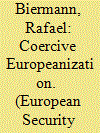

|
|
|
|
|
| Publication |
2014.
|
| Summary/Abstract |
Secessionism is still the predominant conflict type in Europe. Even though the European Union (EU) extended the enlargement perspective to the Balkans 15 years ago, secessionist ambition remains pervasive, especially in Bosnia, Kosovo, Macedonia and Serbia. How does secessionism affect Europeanization and how does Europeanization affect secessionism? It is argued here that in cases of unattained statehood domestic power struggles among deeply divided elites over status and territorial control undermine the consensus needed for Europeanization. In cases of attained de facto statehood the conflict focuses on recognition, which likewise polarizes societies and marginalizes reform. In such high-resistance scenarios, where the inclusionary EU norms clash with the exclusionary norms of the secessionists, the EU vigorously works to marginalize the secessionists by relying mainly on denial, punishment and imposition. Still, the EU's leverage is often insufficient in moving the conflicting parties towards within-state solutions and reform. A study of Bosnia's transformation since Dayton reveals, however, that the EU's leverage varies over time and that the EU at times itself inadvertently fans secessionism.
|
|
|
|
|
|
|
|
|
|
|
|
|
|
|
|
| 6 |
ID:
176047
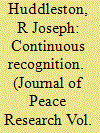

|
|
|
|
|
| Summary/Abstract |
How do self-determination groups move toward diplomatic recognition? Although recognition is the dominant activity used to understand international sovereignty, it is perhaps the most costly decision states make towards these groups. Third parties have many substantial interactions with aspiring states, building their sovereignty by other important means. I argue that our understanding of international sovereignty can be improved by conceptualizing it as a dynamic, continuous process, reflected in foreign policy decisions short of the legal recognition. I create a Bayesian latent variable model of international sovereignty, using bilateral data on diplomatic exchange, IGO voting, sanctions, military aid, and intervention in separatist conflicts. Complementing prior work on international sovereignty, my measure provides support for important theoretical expectations previously explored using only recognition as a measure of sovereignty. I find that diplomatic recognition, extant violence, separatist victory, and sour third-party–incumbent relations positively impact latent sovereignty of separatists, while concern for precedent negatively impacts it.
|
|
|
|
|
|
|
|
|
|
|
|
|
|
|
|
| 7 |
ID:
129191
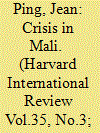

|
|
|
|
|
| Publication |
2014.
|
| Summary/Abstract |
In order to better understand what happened in Mali in 2012 and to seek appropriate solutions to the major obstacles facing this country, it is necessary to recall the nature and causes of the numerous challenges confronting the nation. these vital concerns relate to ethnicity, secession, terrorism, coups, governance, poverty, corruption, drought and climate change. These factors affect not only Mali but also represent obstacles faced by a multitude of other countries on the continent. However, in the case of Mali, these issues were all brought together in the same place and brutally erupted at the same time during the course of the year 2012, provoking disintegration and the subsequent French military intervention.
|
|
|
|
|
|
|
|
|
|
|
|
|
|
|
|
| 8 |
ID:
077134
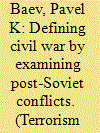

|
|
|
|
|
| Summary/Abstract |
Great many violent events happened during 1991-2005 in the 12 states that emerged after the collapse of the USSR but only a few civil wars are registered in the major datasets. That brings up a number of questions about the operational definitions of civil war that generally point in the direction of shifting the research attention from refining the quantitative parameters to grasping the essense of the phenomena in question. It is proposed that civil war partially overlaps with several other type of violent crisis: inter-state wars, civil unrest and revolutions, internal repression, military coups and mutinies, banditry and organized crime, and terrorism. These overlaps create six 'gray zones' where only very nuanced examination rather than application of rigid criteria could help in distinguishing civil wars from other crises. Therefore, data collection based on a single "robust" definition, which incorporates several verifiable parameters, is not necessarily the only path to scientific knowledge about civil wars
|
|
|
|
|
|
|
|
|
|
|
|
|
|
|
|
| 9 |
ID:
148050
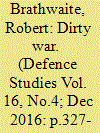

|
|
|
|
|
| Summary/Abstract |
The utilization of chemical weapons to quash domestic rebellion is a drastic action for a regime facing domestic challengers to take, especially given the reputation costs and risk of international intervention. However, recent developments have illustrated that some regimes have contemplated and implemented extraordinary measures (including the use of chemical munitions) to quash rebellion. This study addresses the question of why some states utilize chemical weapons against domestic challengers while others refrain from this level of state repression. I argue that the utilization of chemical weapons has both domestic and international elements. Specifically, that ethnic cleavages that lead to secessionist challenges and factors associated with inter-state rivalry impact the likelihood that a state utilizes the employment of chemical munitions. I test my argument and other explanations regarding repression with a casestudy approach utilizing captured Iraqi Government documents comparing Iraq’s Al-Anfal campaigns with developments during the recent Syrian Civil War.
|
|
|
|
|
|
|
|
|
|
|
|
|
|
|
|
| 10 |
ID:
046655
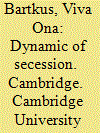

|
|
|
|
|
| Publication |
Cambridge, Cambridge University Press, 1999.
|
| Description |
viii, 246p.
|
| Standard Number |
052165701
|
|
|
|
|
|
|
|
|
|
|
|
Copies: C:1/I:0,R:0,Q:0
Circulation
| Accession# | Call# | Current Location | Status | Policy | Location |
| 045849 | 320.15/BAR 045849 | Main | On Shelf | General | |
|
|
|
|
| 11 |
ID:
137218
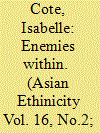

|
|
|
|
|
| Summary/Abstract |
How can we account for the targeted pattern of violence in Xinjiang, in which Uyghur secessionist groups attack some second-order minorities such as the Han Chinese and the Hui, but not the sizeable populations of Kazak, Kyrgyz, and Mongol minorities? Based on a variety of primary and secondary sources, I argue that members of the Han minority, being the national majority in China but a ‘nested minority’ in Xinjiang, are doomed to become a primary target of secessionist attacks as they represent, in and of themselves, the state from which Uyghur nationalists are trying to secede. Han Chinese’s – and to a lesser extent the Hui’s – economic and political dominance over the Uyghurs, along with their lack of historical ties to Xinjiang, also motivates their targeting while reinforcing the bond between other indigenous and comparatively disadvantaged minorities.
|
|
|
|
|
|
|
|
|
|
|
|
|
|
|
|
| 12 |
ID:
116056


|
|
|
|
|
| Publication |
2012.
|
| Summary/Abstract |
This article examines the case for Jammu and Kashmir's independence from India as a matter of remedial justice within the context of a moral right to secede premised upon the circumstances of the state's 1947 inclusion within the Indian union. Principles of remedial justice are defended as a suitable basis for adjudicating rival claims to sovereignty and negotiating secessionist disputes. The case for Kashmir's secession as a matter of remedial justice is then investigated with reference to the claims that India attempted to seize the former princely state by force and reneged on the promise of a plebiscite to ratify its sovereignty. This article argues that, while a contractual understanding of these claims might yield a coherent explication of a right to secede, this would not include a right to independent statehood and should be rejected because of the corollary that Dogra rule was morally legitimate. By contrast, the state's right to secede might be justified by reference to the claim that the events of accession violated its inhabitants' rights to popular sovereignty and self-determination. However, while offering a more plausible account of a right of secession, such a justification would not be a specifically remedial one and would fail to include many of the benefits of a remedial right. Consequently, we need to look beyond the historical events surrounding the state's accession as the basis for reconciling competing claims regarding Kashmir's rightful political status within a framework of remedial justice.
|
|
|
|
|
|
|
|
|
|
|
|
|
|
|
|
| 13 |
ID:
180226
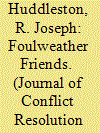

|
|
|
|
|
| Summary/Abstract |
This paper investigates how violence in self-determination conflicts influences bilateral foreign policy. I argue that a general preference for international stability causes third parties to support self-determination groups when violence reaches high levels, when they gain territorial control, and when major powers officially recognize. In these conditions, third parties perceive a stable new status quo to be nigh: unrecognized statehood. Ongoing instability encourages foreign policy that encourages the development of the de facto state, even when third parties have no intention of recognizing them as states. Importantly, I also show that targeting civilians erodes third-party support of the perpetrating side. I demonstrate these relationships using a latent variable model of international sovereignty of aspiring states, built on bilateral military, diplomatic, and economic exchange data. My model and tests provide new insight into how aspiring state actors become increasingly eligible for recognition through the tacit support of third-party states.
|
|
|
|
|
|
|
|
|
|
|
|
|
|
|
|
| 14 |
ID:
131357
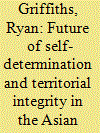

|
|
|
|
|
| Publication |
2014.
|
| Summary/Abstract |
The twentieth century saw the rise of two important and interrelated norms. The first is the norm of self-determination, which advances the right of stateless nations to govern themselves. The second is the norm of territorial integrity, which upholds the principle that political borders should be respected. A consequence of these norms has been an increase in secessionism, a decline in conquest, and a proliferation of states. This paper will examine the development of these norms, their interrelationship, and their prospects for the future. Attention will be given to three important questions: (1) Under what conditions does a norm endure beyond a power transition? (2) How likely is an ascendant China or India to support the norms? (3) What does a power transition and the corresponding support of these norms augur for the future of secession, conquest, and the number of sovereign states?
|
|
|
|
|
|
|
|
|
|
|
|
|
|
|
|
| 15 |
ID:
137936
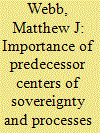

|
|
|
|
|
| Summary/Abstract |
A range of theories have sought to explain and predict secession with varying degrees of success. Arguing that a disproportionate focus upon the seceding group as the unit of analysis has frustrated the development of a comprehensive theoretical framework that is universally valid, this article highlights the role of predecessor institutions of governance and the failure of states to successfully incorporate these as an important, but neglected, causal factor in the study of secession. The inclusion of pre-state institutions of governance and processes of state formation not only results in a more complete, and therefore accurate, explanatory account of secession, but also explains why some regions have been more prone to secession than others.
|
|
|
|
|
|
|
|
|
|
|
|
|
|
|
|
| 16 |
ID:
138883


|
|
|
|
|
| Summary/Abstract |
Scotland is not the only sub-state unit in Europe where relevant political actors make claims for independence. To generate insights on these independence demands, we compare the drivers, arguments and popular support for secession in Scotland, the Basque Country, Catalonia and Flanders. We argue that national identity, party politics and the economy are behind the independence requests, and the exact articulation of these elements varies from case to case. Currently, the most salient of these demands are the ones from Catalonia; Basque demands for self-determination are less prominent than in the past, whereas the demand for a vote on independence is much less articulated in Flanders. Although the Scottish independence referendum has set a precedent for solving independence disputes, we argue that the possibilities of exporting the Scottish referendum experience to other realities are limited.
|
|
|
|
|
|
|
|
|
|
|
|
|
|
|
|
| 17 |
ID:
128328
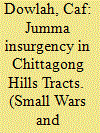

|
|
|
|
|
| Publication |
2013.
|
| Summary/Abstract |
Bangladesh, otherwise a homogeneous society, confronts a serious tribal insurgency in its southeastern Chittagong Hill Tracts region. Before signing a Peace Accord in 1997, the tribal groups, known as Jummas, who constitute 1% of the nation's population but occupy about 10% of its territory, fought insurgency battles for over two decades demanding recognition of their ethnic identities and autonomy of their region. The highly controversial Accord, however, still remains largely unimplemented, and often it evokes fears of secession. This article argues that a probable secession of the Chittagong Hill Tracts (CHT) may not be in the best interests of the Jummas or the people of Bangladesh; and a pragmatic resolution of the issue may lie with granting full functional autonomy to the Jummas in a constitutionally protected reservation area.
|
|
|
|
|
|
|
|
|
|
|
|
|
|
|
|
| 18 |
ID:
066288
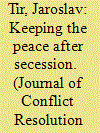

|
|
|
| 19 |
ID:
074758
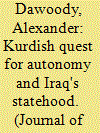

|
|
|
|
|
| Publication |
2006.
|
| Summary/Abstract |
This study examines the Kurdish historic aspiration for self-rule and the opportunities presented by the collapse of the Iraqi regime of Saddam Hussein in 2003. In addressing these issues, the primary objectives are to identify the challenges facing the Iraqi Kurds' quest for self-rule, the problems created by the Kurdish quest for ethnicity-based federalism, and the ramifications of the impending Iraqi federalism for the future of Iraq as a country.
|
|
|
|
|
|
|
|
|
|
|
|
|
|
|
|
| 20 |
ID:
153616
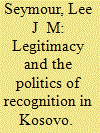

|
|
|
|
|
| Summary/Abstract |
How do contemporary secessionist movements gain international recognition of their claims to self-determination? I argue that international recognition is forthcoming when a sufficient number of states believe a claim to self-determination ought to be accepted. That is, states recognize claims to self-determination when they perceive them to be legitimate. To convince outsiders of the legitimacy of their claims, separatist movements invoke resonant norms and symbols in a moral economy that structures decision-making. I contrast this argument with prevailing explanations of recognition dynamics. To illustrate the argument, I examine the diplomacy surrounding Kosovo’s independence bid and unilateral secession.
|
|
|
|
|
|
|
|
|
|
|
|
|
|
|
|
|
|
|
|
|